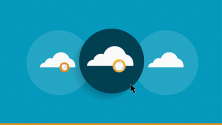Growing up in Pelotas, Brazil, I did not have access to a computer until I was 9 years old. Nobody in my family worked with technology, so it did not occur to me to consider a career in this field until high school, when a friend encouraged me to try a course in electronics.
The course introduced me to programming logic with C and C++, and it was exciting to see logic, math, and technology come together. That inspired me to pursue a bachelor’s degree in Analysis and Development Systems at the university level.
I am very proud of my Brazilian heritage. However, there are relatively few females in this profession, especially in Latin America. Women are still forced to overcome obstacles and stereotypes. Despite my superior grades, for example, it took me longer to land my first job than my male colleagues.
However, I believe that companies are starting to understand the value of diverse thoughts and perspectives in problem-solving; this is exactly what programming is all about. Businesses serve global customers, and input from both men and women is essential. In addition, Hispanics are a rapidly growing portion of the world’s population.
[ Also read Data scientist: A day in the life. ]
After landing my first job as a backend developer in 2019, I was promoted to team leader within three months, which gave me the confidence to take on a new challenge: working with Drupal at another company. I had never worked with a CMS before, but I had great training. My first project was with a client from Germany, and I had to not only learn new technology but also use a new language. That wasn’t easy, but it was a necessary and important part of my career development.
I am so glad that I pursued this path! I get to solve problems daily and work with people from other cultures as a Drupal developer at Jobsity. Here’s how a typical workday shapes up:
8:30 – 11 am: Work out, have coffee, and prepare for the day
11 am: My workday starts with reviewing my email, calendar, and Slack messages to determine whether there are any immediate fires to put out. In my team, every task must be reviewed by at least one colleague before being tested by the QA team. So almost every day, I have some code to review.
I like to start my day tackling these because any delays could impact my colleagues’ work. Next, I review the prior day’s work, revising and refreshing what I need to focus on for the current day.
Noon: Daily standing huddle with my team. We discuss our previous day’s work, identify priorities for the current day, and decide if other teams need support or more resources.
[ Related read Agile adoption: 6 strategic steps for IT leaders ]
12:30 pm: Lunch break.
1:30 pm: Time to knock off tasks on my to-do list. If I need information from my colleagues, I message them on Slack, prioritizing asynchronous communication.
5 pm: On Wednesdays and Thursdays, we have team meetings to plan the next sprint (we work with a cadence of weekly sprints), touch base on important topics with the team, talk about the current and upcoming tech projects, and revise our quarterly milestones.
These meetings are not all tasks and project management; we also share our professional and personal activities. This is always a fun moment of the week; I enjoy learning about other cultures and getting to know my colleagues better.
6 pm: More focus on tasks.
8 pm: Wrap up the workday by noting the time spent on each task. We try to keep the 6 to 8 pm time segment free of meetings so that everyone can finish their daily tasks without interruptions.
8:30 pm: For me, evenings are for relaxing and enjoying activities such as homework, basketball, cooking, studying new technologies, practicing English, reading thrillers, and spending time with family and friends.
Drupal skills are key
I am passionate about encouraging others to consider a career in software – especially girls and young women. A great place to start is with Drupal.
While Drupal documentation is mature and includes many community contributions and forums, it can be challenging to learn without guidance. Consider using the Acquia Preparation Guide. Acquia is a company related to Drupal that offers certification programs – for example, I have the Drupal 9 Site Builder certificate, which is a good goal for those just getting started.
If you can pay for some courses, the Drupalize.me platform offers various videos and helpful explanations. Free documentation and videos from blogs, YouTube channels, and telegram groups can also be a great resource. Fortunately, the Drupal community keeps growing and creating great content.
[ Related read Diversity in IT: 3 key components to enable meaningful change ]
If English is challenging, seek out communities that share your native language. For example, the community from Brazil has a lot of Portuguese content. It does not replace the official documentation but can help users understand some foundational components.
Above all, practice makes perfect. Keep creating projects and testing everything you read or watch; that’s the best way to learn!
Is software development right for you? 7 key questions
Developers are in high demand, and the world needs more of them. We also need diversity and different voices to solve big problems and create great things.
Wondering if you are a good candidate for a career in analytics? Ask yourself these questions:
- Do you love to solve problems? That’s basically what you will do every day.
- Are you logical? You must use logical thinking to solve your tasks.
- Are you good at prioritizing? You must understand what is most important to do first, next, etc.
- Are you patient? Learning takes time and patience, and developing is a team sport. Your focus should be on learning and growing every day.
- Are you empathetic? Beyond technical skills, you will also be evaluated by your ability to work with teams and your soft skills.
- Are you a good communicator? This includes not just verbal skills but also writing and responding to messages and emails.
- Do you have a passion for technology? You will need to understand the basics of programming, know at least one programming language, and know the basics of English to work with global companies.
These are some of the basic skills you’ll need to build a career in analytics. The technical skills will vary according to each position and can be learned through courses, documentation, certification, and higher education programs. While technical skills are important, never underestimate the value of keeping your soft skills up to date and well-practiced.
Don't get too attached to any one skill
An analytics role will require you to learn new skills continuously, look at things in new ways, and embrace new perspectives. In technology and business, things happen quickly. It is important to always keep up with what is happening in the industries in which you are involved.
[ Also read Software development trends: What's flourishing and what's fading ]
Never forget that at its core, technology is about problem-solving. Don’t get too attached to any coding language; just be aware that you probably won’t be able to use the language you like, do the refactor you want, or perform the update you expect all the time. The end focus is always on the client, and their needs take priority over developer preferences. Be prepared to use English every day. To keep your skills sharp, read documentation, talk to others often, and watch videos.
Advice for Latin American developers
My first tip: Find a community that supports you. It is very important to me to bring more women into the software developer community, and my most important personal project is a community called Gurias Tech. In March of 2021, I created this community to encourage and help women find opportunities in the software technology market. I have not forgotten how difficult it was to land my first job and overcome the stereotypes and obstacles that women face.
This group provides a safe space for women to talk about their experiences, encourage and inspire each other, and, more importantly, participate in a valuable network for job opportunities. At Gurias Tech, we created a talent bank connecting women to job opportunities in partner companies searching for more inclusive teams.
I also encourage you to keep your network strong and pay it forward to the next generation of professionals. I participate in events at companies, schools and universities, and civic forums to talk about women in technology. I share my experiences and encourage other women to pursue this rewarding career.
Any analytics professional who is interested in elevating their career should always be attentive to new technologies and updates, become an expert in some specific language/technology, and understand the low level of programming in a variety of languages. Finally, if you enjoy logic, math, and problem-solving, consider a career in software development. The world needs your skills to solve big challenges.
[ What is a 'day in the life' like in your role? If you’d like to participate in this series, reach out here! ]






